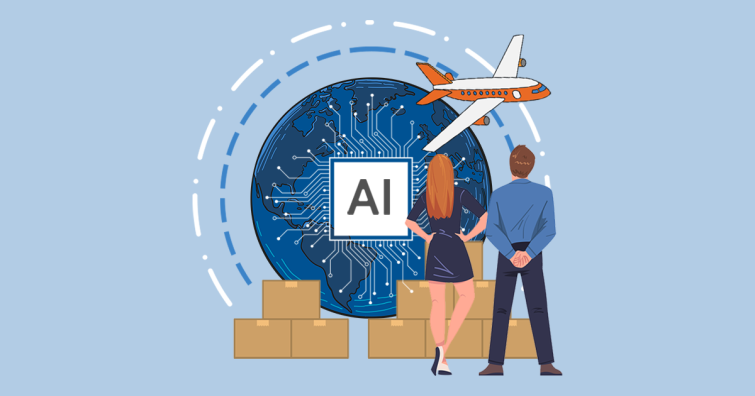Can Artificial Intelligence Improve Global Workforce Mobility? Here are Three Key Ways

Hardly a day goes by that an AI headline isn’t in the news. Industries worldwide are eyeing artificial intelligence and seeking to understand how to leverage it. The global mobility industry is no different. But is AI simply another tech buzz word, or can it be a true transformational tool in your relocation management toolkit? Here’s some insights.
AI Not a New Concept
Sure, it may seem like AI sprung to the tech forefront seemingly overnight. But the recent rapid adoption of AI– the concept of using technology to enhance human capacity — can actually be traced back to the 1950s. However, interest in it, and successful use case demonstrations, ebbed and flowed for decades. That is, until generative AI’s introduction in 2020, enabling AI generators like ChatGPT to intelligently respond to prompts input by users. Suddenly, AI was the “it” technology that every business had to have.
But for what purpose? The frenzy to adopt AI is much like what organizations faced when the internet began to proliferate in the mid-1990s. Back then, the internet was the headline grabber and suddenly organizations were in a race to get a web page created because, well, it was the thing to do, not necessarily because they understood why. It was a classic case of FOMO: they just didn’t want to be late to the party. In many ways, so has it been with AI.
Understand AI’s Purpose
However, rather than blindly adopting AI (or ignoring it altogether), global mobility organizations must look strategically at how artificial intelligence can create value to their relocation management initiatives.
“We cannot afford to ignore AI any longer,” says Deloitte Associate Director Ross Markum. “We as global mobility professionals have an opportunity to master an extremely powerful tool that can deliver untold benefits to our global mobility function, our employees’ experience and even our careers.
“Neither burying our heads in the sand nor trying to crowbar AI into every aspect of our program are viable options. Rather, we should ask ourselves, how can I judiciously use AI to exploit my data, automate repetitive, low-value tasks and drive a world-class employee experience?”
We suggest there are three key ways that artificial intelligence can positively impact global mobility operations.
AI to Enhance Transferee Experience
Relocating is stressful, in fact one of the three most stressful things an individual can experience. Our job as relocation management consultants is to make that experience as smooth, seamless, and pleasant as possible. Having high-touch, single point of care personal service from a relocation consultant can never be replaced by technology. But AI can enhance that experience in ways that only technology can do. A chat feature in the transferee’s relocation portal, for instance, gives that employee the ability to access help from around the world, after hours or weekends, on their time frame. That said, chat features are only as good as the people staffing them after hours.
An AI-enabled virtual consultant or chat bot, trained to know as much about the organization’s relocation policy and processes, can act as a valuable intermediary and immediate source of answers. By curating information on each individual transferee, AI can be a game-changer in helping them navigate the complex relocation process. The virtual assistant knows, for example, that transferee Michael has two elementary-age children who like to swim. While he is in route to his new location, the AI function proactively lets him know of swim classes near his new home and a program at their elementary school. Those recommendations are imbedded inside the platform so that the user experience is organic and personal, much as Netflix recommends content based on a subscriber’s past behavior.
AI to Support HR Leaders
Gartner’s Innovation Insights for Generative AI Study found that generative AI could generate 10% of all data by 2025. We’ve been talking about using data analytics as a strategic driver in mobility HR for years. AI is the tool that finally helps make that happen by giving HR leaders real-time access to actionable data. Not just canned data in Excel spreadsheets or reports that require writing a Sequel query. The HR manager simply types in their question – for instance, what are my year-over-year quarterly numbers for exceptions? – and the virtual assistant graphically maps out the data and presents it in an intuitive interactive dashboard. The virtual assistant gives the HR manager a visual picture in real time of everything related to relocations, down to the individual transferee.
AI to Improve Relocation Management Efficiency
In our experience, a transferee on average works with a relocation consultant between 15-30 hours and asks 25-50 questions over the course of their relocation. If AI can take just a portion of those questions, it could translate to 6,600 hours in time saved for both the consultant and most importantly, the transferee. It also means that those relocation consultants can now focus their time on more complex things that concern the transferee. That means fewer phone calls for the transferee, saving them time and delivering better service. Beyond efficiency, AI can also play a role in supporting mobility sustainability by minimizing paper-based workflows, unnecessary travel, and energy-intensive processes—creating a more eco-conscious approach to global relocation.
Megan Piccininni, who leads IBM’s Global Salesforce Service Transformation practice, put it this way in a June 16, Austin American Statesman article, “AI might not be a panacea to poor customer service, but I believe it can be a powerful ally in an organization’s pursuit to create experiences that can help customers, foster loyalty, and drive growth.
“Freeing up human agents so they can pivot to more personalized customer engagements—where it matters most—is one of the most immediate ways organizations can offer enhanced value to customers, differentiate their brand, and begin transforming customer service from a cost center into a revenue accelerator.”
Learn More
At CapRelo, we are using AI to enhance the speed, precision, and effectiveness of our human intelligence efforts to enhance the transferee experience, empower HR leaders and drive efficiencies. CapRelo’s AI-driven solutions help mobility teams work more efficiently and serve as a virtual consultant for relocating employees providing high touch care in a low touch experience. Explore how we are connecting without connecting by blending self-serve technology with human support to create next-level relocation experiences.
CapRelo has been named number one in customer satisfaction three years running by HRO Magazine. Learn more about our technology driven, AI-supported relocation services at caprelo.com/technology.



